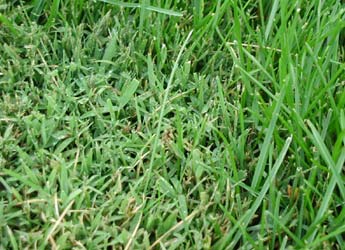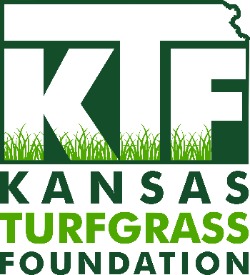Creeping Bentgrass

Creeping bentgrass is an extremely fine-textured, prostrate, spreading, cool-season turfgrass. The leaves appear blue-green to dull gray with a pointed tip and a tall membranous ligule. It spreads using lateral creeping stems called stolons. This is growth habit is incompatible when mixed with upright turfgrass species like perennial ryegrass or turf-type tall fescue. It does not mix well with Kentucky bluegrass either. At lawn height it forms puffy patches of turf that are prone to mower scalping. Additionally, it is more prone to infection by numerous turfgrass diseases like dollar spot and brown patch than typical lawn grasses.
Occurrence
Although this species is one of the premier turfgrasses for golf course fairways, tees and putting greens because it recovers from traffic and divoting it is not desirable in traditional lawns. In lawn situations it forms dense irregular circular patches of turf that disrupt uniformity. It grows well in full-sun, moderate shade, and tolerates wet soils. It is extremely competitive at low mowing heights, < 1 inch, and thrives at ½ inch or less. It is a common contaminant in Kentucky bluegrass seed lots due to its small seed size and this is the most common method for lawn invasion. Transfer of stolons via mowing equipment may be another way it spreads throughout the landscape.
Non-Chemical Control
Maintain proper cultural practices for the species being maintained and mow at the highest possible height for that species. Close, < 1 inch, frequent mowing will favor creeping bentgrass. Infrequent irrigation may help the desirable lawn turfgrass species since bentgrass is not as deep rooted as other species like turf-type tall fescue. If only a few patches of bentgrass are present physical removal with a shovel or sod cutter is an option. Be sure, however, to remove the entire plant including stray stolons, then sod or re-seed with the desirable turfgrass species.
Chemical Control
Small areas in lawns can be spot treated with a non-selective systemic herbicide like glyphosate. Non-selective contact herbicides like glufosinate will provide poor control because they will not completely kill the stolons. Be sure to avoid applying these herbicides to desirable turfgrass species as they will be killed too. Mature creeping bentgrass normally requires two or more herbicide applications to ensure complete control because stolons below the visible turf canopy often escape contact with the first herbicide application and regrow. Once all the bentgrass has been completely killed reseeding or sodding can be accomplished. Currently, turfgrass researchers are exploring selective herbicides like sulfosulfuron for creeping bentgrass and rough bluegrass control in lawn turf and results appear promising. This herbicide, however, will likely not be readily available to home-owners and will require a professional pesticide applicator.



